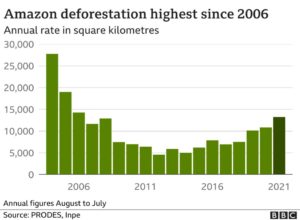Deforestation in Brazil’s Amazon rainforest has hit its highest level in over 15 years, official data shows.
A report by Brazil’s space research agency (Inpe) found that deforestation increased by 22% in a year.
Brazil was among a number of nations who promised to end and reverse deforestation by 2030 during the COP26 climate summit.
The Amazon is home to about three million species of plants and animals, and one million indigenous people.
It is a vital carbon store that slows down the pace of global warming.
According to the latest data, some 13,235 sq km (5110 sq miles) was lost during the 2020-21 period, the highest amount since 2006.
Environment Minister Joaquim Leite said the data represents a “challenge” and said: “We have to be more forceful in relation to these crimes.”
He added that the data “does not exactly reflect the situation in the last few months”.
Deforestation of the Amazon has increased under President Jair Bolsonaro. who has encouraged agriculture and mining activities in the rainforest.
He has also clashed with Inpe in the past over its deforestation, accusing the agency in 2019 of smearing Brazil’s reputation.

But at November’s climate conference in Glasgow, Brazil was among a number of nations who signed a major deal to end and reverse the practice.
The pledge included almost £14bn ($19.2bn) of public and private funds. Some of that will go to developing countries to restore damaged land, tackle wildfires and support indigenous communities.
Close links have previously been uncovered between the deforestation of the Amazon and international supply chains.
Last year, a Greenpeace investigation discovered links between the mass deforestation of the region and food sold in British supermarkets and restaurants.
The investigation found that Tesco, Asda, Lidl, Nando’s and McDonalds were selling meat, sourced from a UK supplier, which had been fed on soy grown on farms built in deforested areas.























